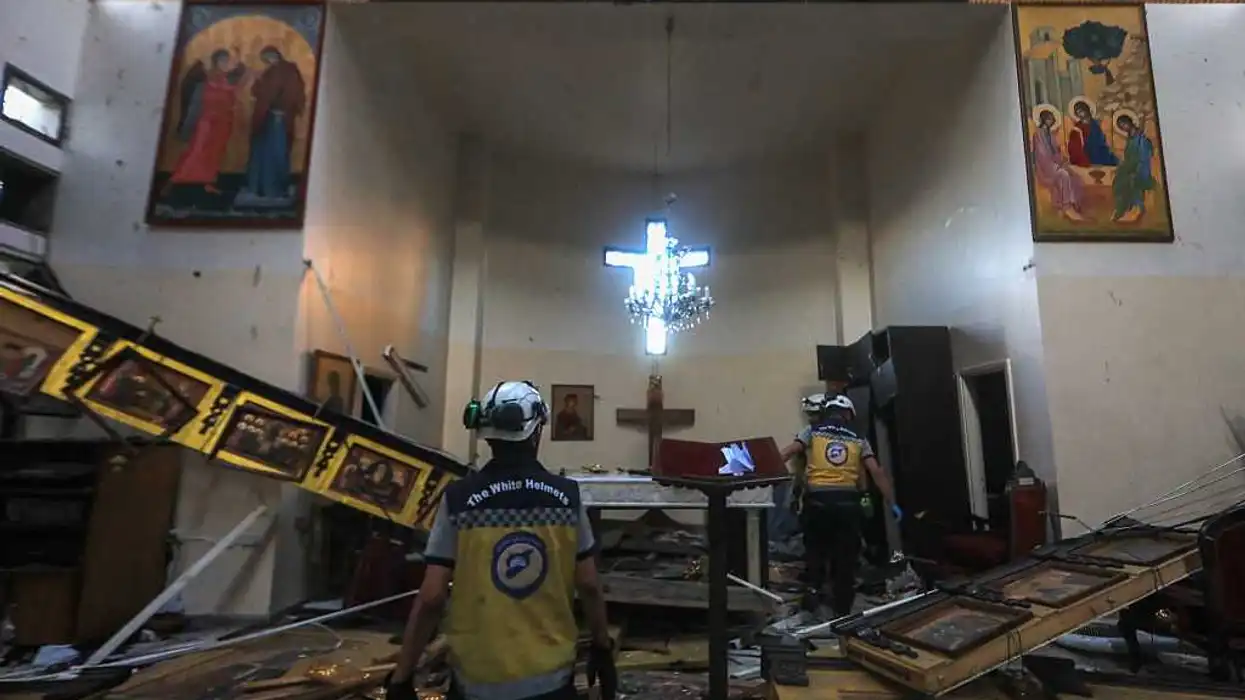- Almost 12 years after it was published, 28 pages of a 9/11 intelligence report are still classified, but some congressional members are pushing for declassification.
- According to former Sen. Bob Graham (D-Fla.), who has seen the entire document, the classified pages expose "a larger effort to cover up Saudi activity in 9/11."
- Rep. Walter Jones (R-N.C.) also says the pages deal with Saudi connections, and believes "it was the influence of the Bush administration to classify those pages."
- Litigation from 9/11 victims' families against the Saudi government has been held up, but a federal appellate court recently overturned the Saudi defense of sovereign immunity.
- Eighty thousand pages of information on a Saudi family that disappeared days before the 9/11 attacks have been turned over to the courts through a Freedom of Information Act request.
♦ ♦ ♦
It has been nearly 13 years since terrorist hijackers turned passenger planes into weapons and flew innocent civilians into the twin towers of the World Trade Center, turning the sunny New York City skyline black from flaming debris and burning buildings.
In the aftermath of the 9/11 attacks — while towers of mangled metal still smoldered in Manhattan, piles of concrete and glass rested below a gaping hole in the Pentagon and a Pennsylvania field was littered with aluminum and dead bodies — national security experts from nearly every government agency frantically raced to uncover just what had happened.
Three years after the attacks, everything those agencies uncovered was thought to be included in what came to be known as the 9/11 Commission Report. When the 9/11 Commission published its exhaustive report — on how the hijackers perpetrated the attacks and what happened that day -- the surviving family members of the victims and Americans at large hoped for a thorough analysis of all the intelligence surrounding this tragic event.
But according to some members of Congress, the intelligence contains a gaping hole that has been smoldering for more than a decade.
For 12 years, 28 pages of a separate report, known as the "Joint Inquiry into Intelligence Community Activities Before and After the Terrorist Attacks of September 11, 2001," that looked into what some of the international connections were and who might have helped the terrorists accomplish their feat, still remain classified to a level that even requires congressional members to obtain special access to review them.
Enough, say several lawmakers. They insist it is time to make those pages public.
"There is nothing in those pages that would compromise our security," Rep. Walter Jones (R-N.C.), told TheBlaze. "When I read it I really felt that nothing in the report would be considered national security, but there are things that deal with relationships, and information that led to relationships that were involved 9/11."
Jones said he was so rattled after reading the 28 classified pages last year, he immediately turned to fellow Rep. Steve Lynch (D-Mass.), who sits on the national security subcommittee for the House Oversight and Government Reform Committee, and insisted he read the pages as well.
 Rep. Walter Jones (R-N.C.) said he believes there are no national security issues preventing the declassification of 28 pages of a 2002 9/11 inquiry — separate from the 2004 9/11 Commission Report — but rather that it's the sensitivity of information about "relationships" that's kept the pages hidden. (AP)
Rep. Walter Jones (R-N.C.) said he believes there are no national security issues preventing the declassification of 28 pages of a 2002 9/11 inquiry — separate from the 2004 9/11 Commission Report — but rather that it's the sensitivity of information about "relationships" that's kept the pages hidden. (AP)
The pair wrote a bipartisan resolution calling for President Barack Obama to declassify the information; the legislation was formally introduced in late 2013.
Their effort has since gained slow but steady steam, seeing members like freshman Rep. Thomas Massie (R-Ky.) join in and Rep. John Duncan Jr. (R-Tenn.) sign on this week as well, Jones said.
But why were those pages classified to begin with? And who decided to classify them at such a level that even members of Congress have to seek special permission to view them?
[sharequote align="left"]"It was part of a larger effort to cover up Saudi activity in 9/11."[/sharequote]
Jones told TheBlaze the classified pages reveal information specifically about Saudi Arabian connections to the White House and more, and that's why they have been kept under wraps.
"I think it was the influence of the Bush administration to classify those pages, and that [they believed] those 28 pages of the report needed to be classified," Jones said.
Jones was prompted to dig deeper and ask more questions about the classified documents when former Sen. Bob Graham (D-Fla.), who co-chaired a congressional inquiry into 9/11 — separate from the 9/11 Commission — brought it to his attention.
"None of the people leading this investigation think it is credible that 19 people — most who could not speak English and did not have previous experience in the United States — could carry out such a complicated task without external assistance," Graham told TheBlaze.
But now, Graham says, a breakthrough may finally be around the corner. Not just about the declassification of the 28 pages, but for so much more.
 Former Sen. Bob Graham (D-Fla.) said he expects a breakthrough soon in several efforts seeking more clarity about Saudi involvement before and during the 9/11 attacks. (AP/Phil Sandlin)
Former Sen. Bob Graham (D-Fla.) said he expects a breakthrough soon in several efforts seeking more clarity about Saudi involvement before and during the 9/11 attacks. (AP/Phil Sandlin)
Graham said he's happy to see members like Jones, Lynch and Massie take on the legislative battle to see the 28 pages declassified. He's also seen movement on two other fronts regarding 9/11.
"The second is this litigation in the federal courts of New York ... some 6,000 plaintiffs ... against mainly Saudi interests, claiming that they were essentially co-conspirators to 9/11 and that litigation has been blocked by the Saudis' use of sovereign immunity as a defense," Graham said. "But recently the federal appellate court that covers the state of New York overturned that defense and the Supreme Court has refused to hear the Saudis' case and now there will be an aggressive effort through the courts to get information about Saudi involvement in 9/11."
Graham said the third issue is what most people refer to as the "Sarasota case," the Florida city where three of the hijackers did flight training.
"There is strong suspicion that they had close relationships with a prominent Saudi family living in Sarasota, the family which approximately two weeks before 9/11 -- under what has been described by law enforcement as 'urgent conditions' -- left their home and returned to Saudi Arabia," Graham said.
Graham said that raised the question of, "Were they tipped off to what was about to happen?" Now, he says, investigators may finally get an answer, because 80,000 pages of information the FBI had previously withheld about the Sarasota case have been turned over to the courts, thanks to a Freedom of Information Act request.
Graham believes all three of these fronts: the 28 pages, the New York litigation, and the Sarasota case, will soon lead to fuller disclosure of 9/11 information for the American people.
"The truth is, I don't know who ultimately made the decision to classify those pages, but it was part of a larger effort to cover up Saudi activity in 9/11," Graham said. "And actions that were all towards that end led me to believe that it wasn't an individual decision by the FBI or the CIA or the NSA, but that there was some federal directive to all the agencies to take those actions that would disguise Saudi activity in 9/11."
On The Glenn Beck Program this week, Massie explained why he chose to join Jones and Lynch in their legislative battle.
"The American public needs to have it,” Massie said. And while "it will not endanger us to release this information," it could end up as an "embarrassment" for potentially two presidential administrations.
“It challenges you to rethink everything,” Massie told Beck, referring to what he saw.
Ultimately, Jones believes, this is about the families and about building a strong society based on truth.
"There can be no freedom if the government hides critical information that reveals the truth about one of the worst disasters in our country, and when the American people are denied the truth, there is no hope for the country," Jones said.
Jones said he wants Obama to keep the promise he made to the 9/11 victims' families.
"He looked at the families in 2009 and said he would declassify the pages," Jones said. "These families who have suffered so much pain have a right to see those pages, and we are going to continue to beat this drum -- but the only way we'll succeed is if people from around the country contact their members of Congress and tell them to support this effort."
--
Follow Elizabeth Kreft (@elizabethakreft) on Twitter

 Rep. Walter Jones (R-N.C.) said he believes there are no national security issues preventing the declassification of 28 pages of a 2002 9/11 inquiry — separate from the 2004 9/11 Commission Report — but rather that it's the sensitivity of information about "relationships" that's kept the pages hidden. (AP)
Rep. Walter Jones (R-N.C.) said he believes there are no national security issues preventing the declassification of 28 pages of a 2002 9/11 inquiry — separate from the 2004 9/11 Commission Report — but rather that it's the sensitivity of information about "relationships" that's kept the pages hidden. (AP)






